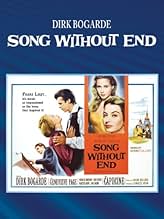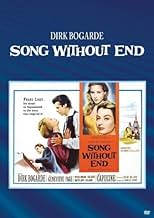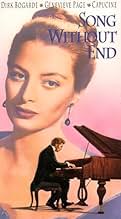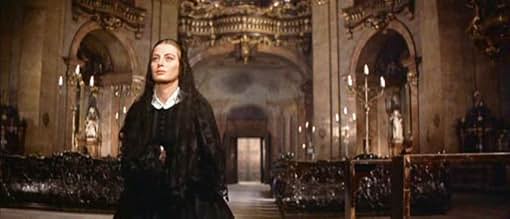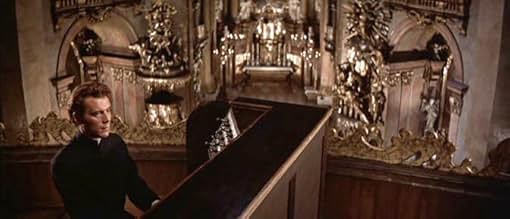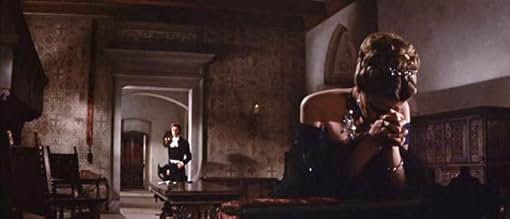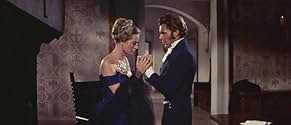Añade un argumento en tu idiomaThe romantic story of Hungarian pianist Franz Liszt (Sir Dirk Bogarde), whose scandalous love affair forced him to abandon his adoring audiences.The romantic story of Hungarian pianist Franz Liszt (Sir Dirk Bogarde), whose scandalous love affair forced him to abandon his adoring audiences.The romantic story of Hungarian pianist Franz Liszt (Sir Dirk Bogarde), whose scandalous love affair forced him to abandon his adoring audiences.
- Ganó 1 premio Óscar
- 2 premios y 3 nominaciones en total
- Thalberg
- (as E. Erlandsen)
- Chopin
- (as Alex Davion)
- Emissary
- (escenas eliminadas)
- Audience Member
- (sin acreditar)
- Komparsenrolle
- (sin acreditar)
Argumento
¿Sabías que...?
- CuriosidadesCharles Vidor had completed about 15 percent of this movie when he died of a heart attack on June 4, 1959. Sir Dirk Bogarde later recalled that he was "secretly relieved" by Vidor's death, since he and his co-star, Capucine had been treated badly by the short-tempered director. Vidor would often scream at Capucine to relax, and at one point, Bogarde recalled, "shook her like a dead cat." Vidor was replaced by George Cukor, who got along much better with his stars, and was more of an "actor's director."
- PifiasGrand Duchess make reference to "Ukraine" in one scene. The term was not in wide use in the 1840s, especially not among Russian nobility.
- Citas
Countess Marie: I met Franz at a musical party. I remember he played a ballade in A-flat major by Chopin. I thought I'd never seen anything as beautiful as Franz looked when he sat at the piano. I... I wanted to cry. He watched me as he played; Franz never fails to notice a pretty woman in his audience. Afterward, he followed me into the hall. I remember he said, "May I escort you somewhere, madame?" And I said, "Yes." And he said, "Where?" And I said, "Paradise." He didn't smile - he said, "I'll call a carriage."
Princess Carolyne: Did he?
Countess Marie: What?
Princess Carolyne: Drive you there - to paradise?
Countess Marie: [a pause, and a meaningful look as she turns to leave the room] He doesn't know the road, madame.
- ConexionesFeatured in Film Profile: Dirk Bogarde (1961)
The set decorations here are phenomenal, they're on par with the great 1944 film "Wilson."
The music is magnificent although we could have done without knowing about the friendship between Liszt and the anti-Semite Richard Wagner. Another flaw is the miscasting of Lou Jacobi as Bogarde's manager. Jacobi sounded like he came out of the Catskills. This film for Jacobi came after his super performance, the year before, in the beloved "The Diary of Anne Frank." (Happy Birthday Lou as you turn 95 on Dec. 28th.)
The first part of the film deals with Liszt's career. His playing in concerts in various European countries was remarkable. The second part deals with his ill-fated love with the Countess Cathryne of Lichtenstein.
While we see that Liszt entered the priesthood when his proposed marriage to Cathryne was rejected, we really can't tell if Cathryne became a nun. I imagine no since she was still technically married in the eyes of the church. Nonetheless, we have a powerful, beautifully acted film. Too bad that Totentanz, a Liszt masterpiece, was not played here. I had to know that piece of grand music in a required music course at college. Like the movie, Totentanz was a masterful piece.
- edwagreen
- 12 dic 2008
- Enlace permanente
Selecciones populares
- How long is Song Without End?Con tecnología de Alexa
Detalles
- Duración2 horas 21 minutos
- Relación de aspecto
- 2.35 : 1
Contribuir a esta página



